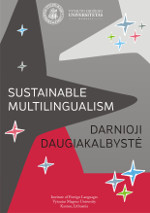MULTILINGUALISM IS GREAT – BUT IS IT REALLY MY BUSINESS? – TEACHERS’ APPROACHES TO MULTILINGUAL DIDACTICS IN AUSTRIA AND GERMANY
MULTILINGUALISM IS GREAT – BUT IS IT REALLY MY BUSINESS? – TEACHERS’ APPROACHES TO MULTILINGUAL DIDACTICS IN AUSTRIA AND GERMANY
Author(s): Stefanie Bredthauer, Hilke EngferSubject(s): Education, Foreign languages learning, Applied Linguistics
Published by: Vytauto Didžiojo Universitetas
Keywords: multilingual didactics; teachers' approaches; Austria and Germany;
Summary/Abstract: Over the past few years, a number of concepts and multilingual pedagogical approaches for all language subjects have been developed that can be summarized under the umbrella term multilingual didactics. These approaches focus on cross-lingual skills and integrated language learning. The need arose because the established didactical concepts assumed a linguistically homogeneous group of students (monolingual habitus), whilst today’s schools are marked by an astonishing and growing linguistic heterogeneity. In this article we present the results of our review of twelve empirical studies that deal with a number of questions concerning how language teachers in Germany and Austria feel about multilingual didactics, the effectiveness of their training, and how they implement it into their teaching. The findings show that language teachers in Austria and Germany advocate a multilingual pedagogical approach. Nevertheless, they treat their multilingual classes like homogeneous monolingual ones. This can be explained by a number of reasons, the most important ones being a lack of professional development and appropriate course books in this area. As a result, a significant number of language teachers do not consider multilingual didactics as part of their responsibility; consequently, students’ experiences as speakers/learners of multiple languages are not taken into account. Based on these key findings, we derive recommendations with regard to the professional development of language teachers, teaching and learning resources, further research, as well as recommendations for practitioners and stakeholders.
Journal: Darnioji daugiakalbystė
- Issue Year: 2016
- Issue No: 9
- Page Range: 104-121
- Page Count: 18
- Language: English

